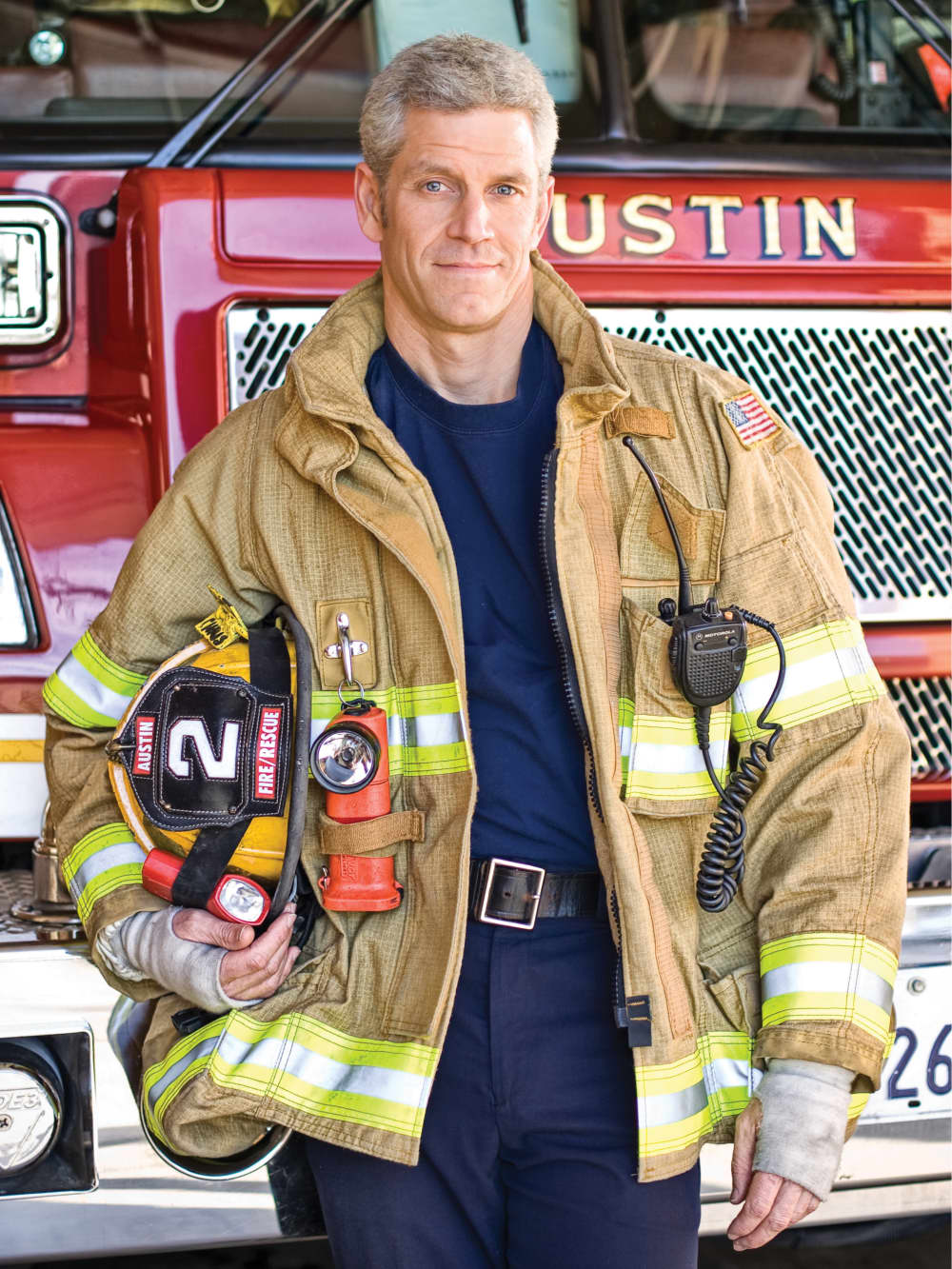Real Men Eat Plants
Making healthy eating a cultural value: Rip Esselstyn's Engine 2 plan to fuelAmerica
 Rip Esselstyn receives the first Humane Hero award on May 8.Courtesy photo
Rip Esselstyn receives the first Humane Hero award on May 8.Courtesy photo Esselsytn is the author of The Engine 2 Diet.Courtesy photo
Esselsytn is the author of The Engine 2 Diet.Courtesy photo
If triathlete-cum-firefighter Rip Esselstyn can re-engine how an entire Austin fire brigade eats, imagine what he can do for you. When his station's diet of pizza, burgers and fried chicken wings was replaced with a colorful rainbow of plant-strong foods, whole grains, beans and legumes, many of his close colleagues morphed from medical time bombs to health superheroes.
As Esselstyn's website posits, "real men eat plants." He asks for a 28-day commitment for a wellness overhaul. The rest is up to you.
Esselstyn was bred for the job. His father, Dr. Caldwell Esselstyn, authored Prevent and Reverse Heart Disease, was featured in the documentary Forks Over Knives, has been associated with the Cleveland Clinic since 1968 and is a former Olympic rowing champion. Following in his footsteps, Rip Esselstyn has transcribed his father's research into a program that has worked for many, including this reporter.
It's fitting that Whole Foods Market's 28-day Health Starts Here Challenge concludes with a pep talk by the author. Set for 6:30 p.m. Monday, Esselstyn plans on sharing more of his knowledge with those that care to listen.
En route to Houston, CultureMap interviewed the author via email to learn more about plant-strong protein, super foods and his future plans with the Engine 2 Diet.
CultureMap: Let's address the protein dilemma. Other than quinoa and a few other superfoods, vegetable protein is referred to as "low quality" because it doesn't contain all of the essential amino acids not produced by the human body. I hear this justification often for dieters consuming animal protein, which is referred to as "high quality." How important is it that we plan our meals to get all those missing micronutrients? Do we have to at all?
Rip Esselstyn: It is important that we eat a wide variety of foods — plant foods. Once upon a time, there was the belief that you had to combine certain plant foods with other plant foods in one meal in order to create a "complete or complementary protein." We now know that this simply is not true nor necessary.
Sure, every plant food does not exactly match the suggested pattern of essential amino acids, yet when our diet provides our body with a wide assortment of plant proteins over the course of the day (not the same meal), all amino acids will be present in abundance. Meeting the body's needs for all the essential amino acids is easily done with an assortment of plants.
The other thing to note is that the human body does not differentiate if an amino acid comes from steak or broccoli. Plants are not incomplete. Yes, they may be lower in one amino acid and higher in another but as long as you are meeting your calorie needs with a variety of plants, you will be eating adequate (and not excessive) amounts of protein.
Once in our body's tissues, essential amino acids from animal foods and plant foods are indistinguishable. In fact, the mother source of amino acids in animal protein (historically referred to as "high quality") actually comes from plants. For example, think of a cow that eats grass or grains or a fish that eats seaweed.
CM: Nutritional science is just uncovering the role of phytonutrients and micronutrients as carriers of health. What's the most exciting scientific discovery that has given you the prowess to stay the course?
RE: You are correct, phytonutrients are the greatest discovery in nutritional sciences this century. So far, thousands of phytonutrients have been discovered — and who knows how many more there are left to be discovered. Of note, phytonutrients are nowhere to be found in animal foods.
CM: We want to know: Do you follow what you preach and do you allow yourself to cheat? How do you live without bacon and pizza, two of America's favorite and scariest foods?
RE: I 100 percent walk the talk. I am 100 percent plant-strong and have been for 25 years. If I allow myself to get decadent it is with plant-based desserts. I look at bacon, ham and cheese the same way I look at cigarettes: They have absolutely zero appeal to me. It's time for America to pick itself up by its boot straps and make healthy eating a cultural value.
CM: If you could name one food that is pure nutritional magic, which one would you choose and how would you consume it? I would guess Kale, but I could be wrong.
RE: I do not believe that just one food is nutritional magic. The magic comes from the totality of whole, plant-healthy foods that are found in the entire produce department in addition to legumes and whole grains. These are your super foods.
CM: Who has been your biggest influence in your health journey? I can imagine your father's research has impacted you greatly, but I am wondering if there are unsung heroes that have kept you plant-strong?
RE: My father for his unwavering commitment to his research on preventing and reversing heart disease. My mom for her unwavering support in plant-strong meal explorations and preparations. And Dave Scott for being one of the pioneering athletes who won six Hawaii Ironman competitions fueled by plants.
CM: Do you have plans to write a follow-up for Engine 2 Diet?
RE: Yes! Another Engine 2 is already in the works. It is going to be entertaining, informative and compelling. It will also contain 135 plant-strong recipes. Keep your eye out for it in May 2013.
Rip Esselstyn will be the featured speaker at Whole Foods Market Montrose's Health Starts Here Challenge Graduation Day on Monday, 6:30 p.m. A lecture will be followed by a book signing. Admission is free.
The Health Starts Here Challenge is an overarching initiative during which participants receive health and fitness tips, participate in cooking classes and tastings and score gift bags and prizes.
